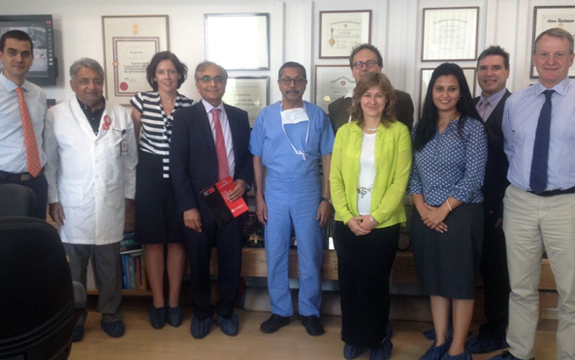Swinburne and India partner to address health issues

In Summary
- Swinburne has signed two memorandums of understanding with India
- One project will see researchers improve the diagnosis of epilepsy in villages and remote communities across India
- Another project will see researchers develop a cutting edge ‘smart helmet’ that will reduce head injuries for motorcyclists
Neuroscience researchers from Swinburne University of Technology are partnering with leading Indian medical organisations to address growing health issues.
On a trade mission to India, with representatives from the Victorian Government and Austrade, Swinburne representatives formalised agreements with Indian partners.
Epilepsy diagnosis
Swinburne will work closely with Medanta, one of India’s largest private hospitals, to improve the diagnosis of epilepsy in villages and remote communities across India.
This project will develop products and technologies that can be used to help local health workers diagnose epilepsy in the early stages and refer patients for treatment in urban centres.
This partnership will build on Swinburne’s existing research into epilepsy, which last year saw researchers pinpoint abnormal brain regions for epilepsy, offering promise for improved surgical treatment.
Pro Vice-Chancellor (International Research Engagement and Development) Professor Ajay Kapoor says that this collaboration has the potential to transform quality of life for thousands of people.
“Using technology to educate Indian health workers, we will be able to ensure that those suffering from epilepsy know where and how they can be treated properly.”
A smarter helmet for the road
Swinburne also signed a memorandum of understanding with the prestigious All India Institute of Medical Sciences to develop a cutting edge ‘smart helmet’ that will reduce the incidence of head injuries for motorcyclists.
Currently, two thirds of road vehicles in India are two wheelers and thousands of people die on India’s roads every year. Many more also experience injury and trauma from motorcycle accidents, but people still do not wear helmets.
Drawing on research expertise within Swinburne’s Centre for Design Innovation Smart Health Hardware program, the helmet will be light weight, with cooling and connections to smart phones.
Director of Swinburne’s Centre for Design Innovation, Kurt Seemann, says that the smart helmet would address the issues that discourage people from wearing helmets.
“We’re redesigning the helmet to meet the needs of India. We’re going to address the main issues that prevent people from wearing them. By creating a helmet suitable for a warm climate, at a low price, that's upgradeable and uses smart phone technology, we have the potential to save many lives.”
Swinburne’s collaboration with India
The recent partnership signings with India build on Swinburne’s focus of meaningful international research engagement.
“Swinburne has been working closely with India for many years. We have relationships with a number of universities in India and these new memorandums of understanding will allow us to deepen our connections with the country,” Professor Kapoor says.
“There are incredible opportunities for Victorian doctors, scientists and researchers to work with their counterparts in India to make breakthroughs that will deliver significant health benefits to the community.”

